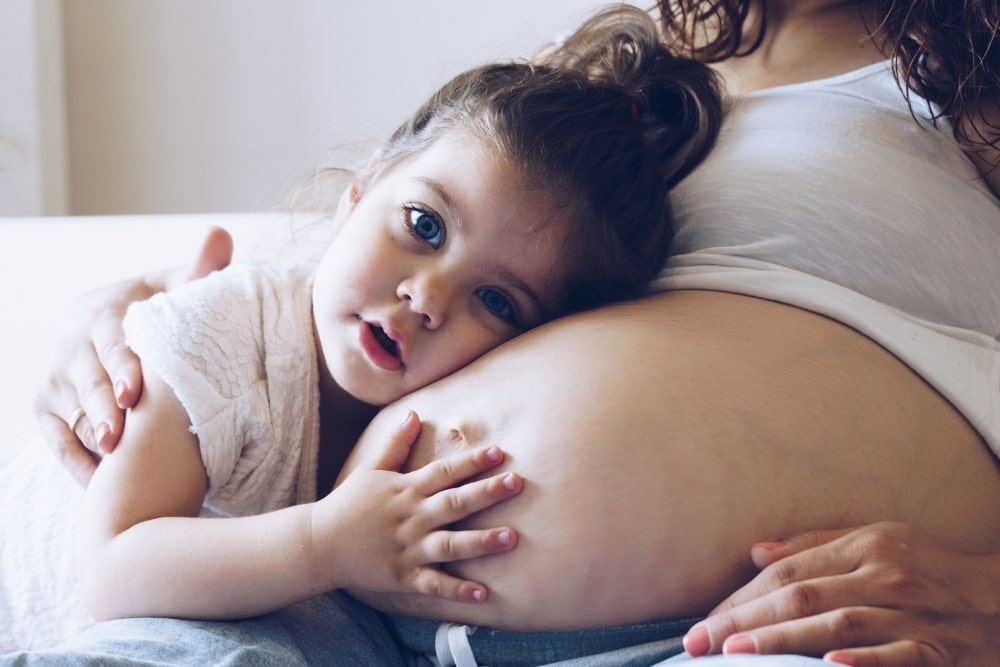From the minute that your baby is conceived until you give birth your body goes through some of the most remarkable changes. While every pregnant body changes, they do not change in the same way as no two pregnancies or bodies are the same.
This also means that you may have some questions coming to your mind that none of your pregnant friends have experienced and so do not know the answers to. One such question is why is my stomach soft during pregnancy?
Let’s take a look at the factors that influence the shape of your baby bump as well as answer the question.
Why Is My Pregnant Belly Hard or Soft?
Even if you start feeling the symptoms of pregnancy soon after discovering you are pregnant, you may not notice a bump until much later on. Thanks to the media most of us associate a hard round belly with pregnancy but they vary hugely from woman to woman.
Comparing your bump with another woman is a big mistake as every single pregnancy is different and every woman carries it differently. By comparing, you may begin to worry that there is something not quite right with your pregnancy.
But there is nothing to really worry about as there are many factors that have an impact on what your bump looks and feels like. To start with, it will depend on if this is your first pregnancy or if you have had previous pregnancies.
First-time moms may not look pregnant until they are quite far into the second trimester this is mainly due to them having tight abdominal muscles.
Other factors to consider are:
- Number of babies (multiple births)
- Body fat percentage
- Baby’s position
- Shape of uterus
- Previous pregnancies
- Amount of fluid you are carrying
You may notice that the shape of your bump changes throughout the day, with many women reporting that their bumps are smaller and firmer in the morning than in the evening.
View in gallery
This is due to your abdominal muscles gradually stretching throughout the day. As well as your baby changing positions throughout the day can also change the shape of your belly.
So Why Do Bellies Get Hard During Different Trimesters?
As you get closer to your due date your uterus expands which in turn causes your belly to grow this makes it feel increasingly firmer or hard. Even though every pregnancy goes through this growth and expansion it looks very different for each and every woman.
There are a few other reasons why your belly may become hard during pregnancy including:
- Expansion of your uterus
- Gas, bloating, constipation, or other gastrointestinal issues.
- Your baby moving around and changing positions.
- Braxton hicks contractions
- Actual labor contractions
However many of these reasons also come and go throughout the day meaning that your belly may be rock hard one minute and soft the next.
This can be a little stressful and even worrying for first-time moms who have not experienced this before and now feel that there may be something wrong as their bump has disappeared.
Depends On The Trimester
Depending on which trimester you are in will also play a part in how soft or hard your belly is.
First Trimester
The first trimester is when those pregnancy hormones really hit you head-on like a freight train – they do not hold back! With those hormones also come some unpleasant symptoms such as:
- Nausea
- Tender breasts
- Fatigue – I have never felt so tired.
- Cravings and food aversions
- Heartburn
- Constipation
- Increased urination
And even though you are dealing with all these symptoms of pregnancy you will probably not look like you are pregnant until your second trimester after 12 weeks.
During the first trimester, it is likely that any changes to the firmness of your belly are due to gas or bloating brought on by the pregnancy hormone progesterone.
Second Trimester
View in gallery
The second trimester is weeks 13 to 27 of your pregnancy and during these weeks is when you will notice huge changes to your body and it will become increasingly difficult to hide the fact that you are pregnant. Some of the changes that you may be experiencing are:
- Both your belly and breast increase in size
- Changes to your skin such as stretch marks
- Dizziness
- Sensitive teeth and gums
- Leg cramps
- Nosebleeds
- Increased vaginal discharge
- UTI
- Braxton Hicks contractions
By the time you reach your second trimester, many pregnant women begin to get relief from some of those earlier symptoms such as nausea.
Another reason that many pregnant women favor this trimester apart from the easing of some of those less than pleasant first trimester symptoms is that although their belly may have popped they are still small enough to not yet be cumbersome.
The American Pregnancy Association states that your uterus will be around the size of a papaya in this second trimester and it no longer sits in your pelvis. As it is situated between your navel and breast bone this is the reason why most women really begin to start showing at this time.
During this second trimester, your muscles will begin to stretch and you may begin to feel Braxton Hicks contractions both of which will make your belly feel hard.
Third Trimester
This stage begins around week 28 of your pregnancy and you can now see the light at the end of the tunnel.
Common symptoms of this trimester are:
- Swelling
- Frequent need to pee
- Increased pelvic discomfort
- Braxton Hicks contractions
- Heartburn
- Indigestion
- Shortness of breath as your baby increases in size and pushes against your other organs.
As you near your due date your uterus will reach the size of a watermelon. At this point, your belly may feel hard as your skin is stretched so tightly over your expanding belly.
View in gallery
By this time, you may also be feeling a great deal of discomfort but remember you are in the home straight. In preparation for birth, your baby will drop back into your pelvis.
Although this step will enable you to breathe more easily, the side effect is that as your baby is pushing down on your pelvis and bladder you may experience more pelvic pain and the need to pee more frequently.
This is also the time when your Braxton Hicks contractions will be replaced by true contractions, meaning that your baby is on his/her way.
Causes Of A Hard Belly During Pregnancy
As we have said, there are a number of reasons why your belly may be hard during pregnancy besides the most basic reasons that every woman is built differently.
Every woman carries differently and every woman’s body responds to pregnancy in a completely different way.
Many of these reasons cause your belly to become gradually harder over time while others are symptoms of pregnancy and come and go as your pregnancy develops.
Growing Uterus
From the moment you conceive your uterus is beginning its long journey of growth in order to provide your little one with a safe and comfortable space for them to grow and develop. Your uterus will stretch from the size of an orange to the size of a watermelon in order to do this.
As your ever-expanding uterus grows, it causes your belly to become larger and this, in turn, causes your abdominal muscles to stretch making your skin tight.
As you progress through your pregnancy your uterus gets larger and your stomach potentially can get harder and firmer.
Unfortunately, your expanding uterus doesn’t just expand outwards but also inwards squashing your organs. This can cause a great deal of discomfort and pain in later pregnancy.
View in gallery
Gas
Gas in pregnancy is quite common and is caused by the increase in hormones like progesterone – this hormone helps to maintain a healthy womb in which your baby can grow.
But for all the good that they do they also cause your muscles to relax in your intestines, which in turn causes your digestion to slow right down. This excess gas can cause your belly to become hard and uncomfortable.
There are a few things that you can do to help to ease the problem, such as:
- Ensure that you are drinking plenty of water.
- Avoid foods that can cause gas or constipation such as carbonated drinks, cruciferous vegetables, and dairy.
- Keep moving, even in those later months.
- Eat more fiber.
Braxton Hicks Contractions
Most pregnant women have heard of Braxton Hicks contractions and they are very common in the second and third trimester. All they are is your body training for the big final event of giving birth.
They are not usually painful but can be a little uncomfortable. These types of contractions are irregular and can last a few minutes at which time your stomach may feel tight and then relax again.
These are often mistaken for the beginning of labor but unlike actual labor, they do not increase in intensity and if you change the position, they normally go away.
If you are unfortunate enough to experience uncomfortable or even painful Braxton Hicks then there are a few things you can do to ease them:
- Drink plenty of water and ensure you stay hydrated.
- Try taking a warm relaxing bath
- Change position or move around.
Position Of Baby
As your pregnancy progresses and your baby grows you will notice them moving around your womb finding a comfortable position.
As they get bigger this movement will become more and more apparent and you will feel every turn, kick and stretch.
View in gallery
Depending on the position that your baby gets comfortable in will depend on the hardness of your belly – you may notice that one spot is soft while another is rock hard.
Baby Dropping Into Pelvis
Late in your third trimester, you may suddenly feel like your breathing is a little easier but now you need to pee all the time, this is your baby moving down into its final resting place before birth. This is often called ‘lightening’.
With this lightening, you may notice that the top of your belly is now softer while the bottom feels much heavier. If you are not sure if your baby has dropped down into your pelvis there are some other signs to look out for:
- Pressure in your pelvis and possibly pain.
- The need to pee all the time.
- Back pain or increased back pain.
- Hemorrhoids
- Breathing becomes a little easier.
- An increase in your appetite.
Labor
If this is your first pregnancy telling the difference between actual labor and Braxton Hicks contractions can be a little difficult. For some women, they can feel very similar.
Both make your belly feel hard and tight but Braxton Hicks contractions do not usually cause your pain and they do not increase in intensity as true labor contractions do.
How To Tell The Difference Between Real Labor And False Labor
If this is your first pregnancy you may be wondering how you are going to tell the difference between Braxton Hicks contractions and labor contractions.
Let’s put your mind at rest that you will be able to tell the difference. But just in case you have any doubts here are a few key points to keep a lookout for:
| Labor Contractions | Braxton Hicks Contractions | |
| Intervals | Regular | Irregular and infrequent |
| Duration | 30-70 seconds | 15-30 seconds |
| Intensity | Gradually increase over time | Intensity stays the same |
| Easing | Breathing, drugs such as gas and air. | Changing position or taking a bath |
| Other Symptoms | Water breaking, increased pelvic pain, and back pain |
FAQs
Why is my pregnant belly not getting hard?
After 20 weeks of pregnancy, you may notice that your belly gets hard but only for a few seconds, these are more than likely practice contractions also known as Braxton Hicks contractions.
Braxton Hicks can occur several times a day but they are not usually painful or cause any discomfort.
View in gallery
Should your stomach be hard or soft when pregnant?
Normally you would expect your belly to be hard when you’re pregnant. This hard feeling is caused by the pressure of your growing uterus putting pressure on your abdomen.
But how pronounced your stomach is and how hard it gets is also determined by other factors such as your weight and build.
The Final Thought
The thing that you need to remember is that every woman is different and therefore every pregnancy is different.
Some women will have round firm bumps while others will have bumps that are softer and a little more squishy. But either way, there is normally nothing to worry about, enjoy your pregnancy and marvel at all your body has accomplished.
All you need to know about your pregnancy, check out our ultimate guide here.






